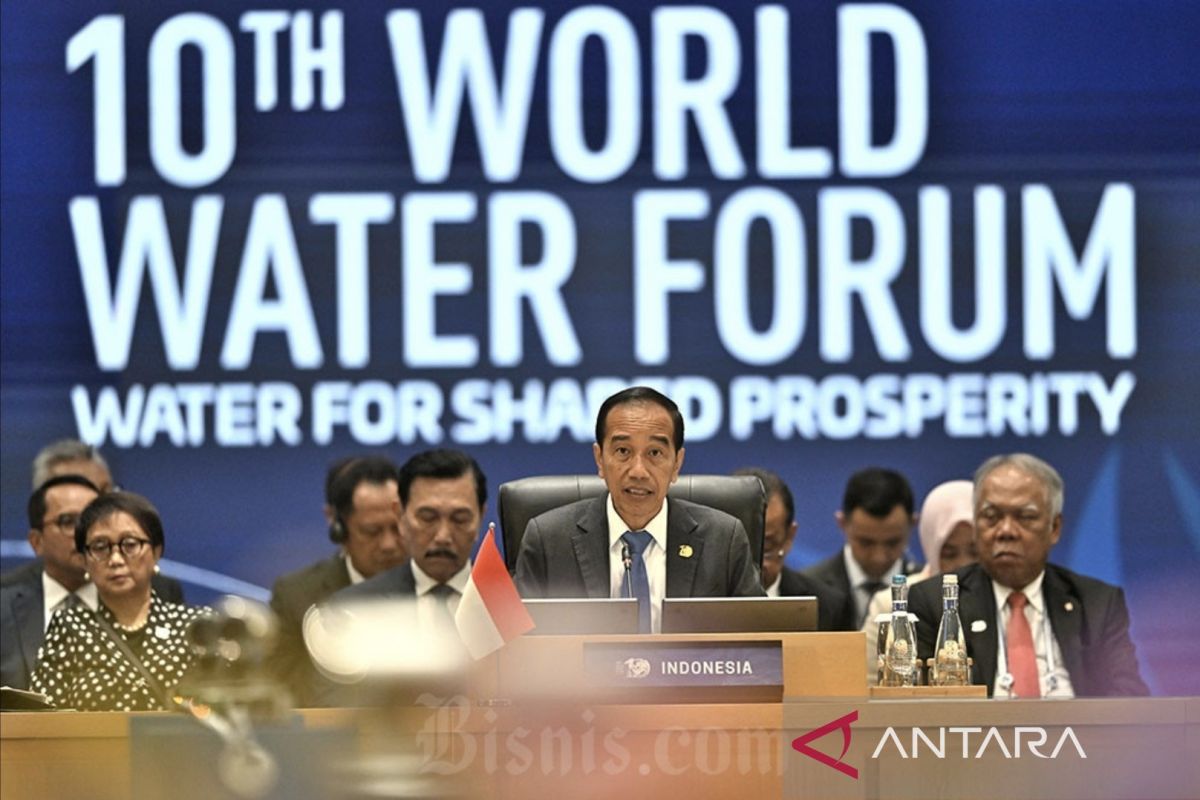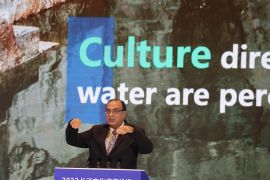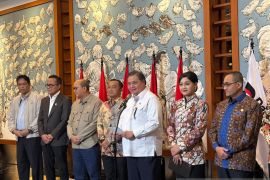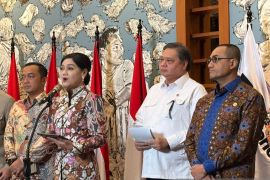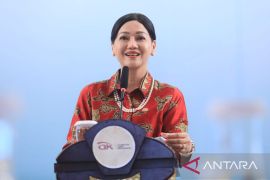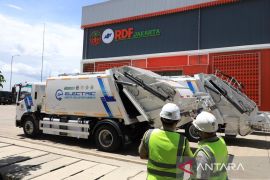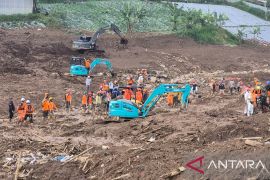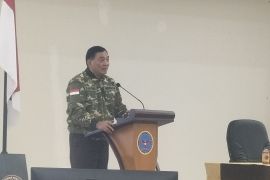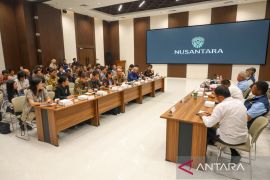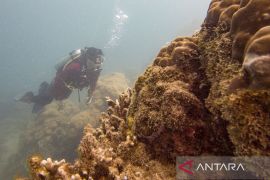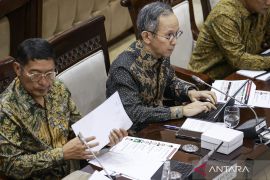Call for collaboration for tackling water crises
At the opening of the 10th World Water Forum Summit at Bali International Convention Center (BICC) in Bali on Monday (May 20), President Joko Widodo (Jokowi) said that collaboration is vital to successfully handle the global challenges related to water.
“By gathering together in Bali today, of course, Indonesia hopes that the world can join hands continuously to strengthen the commitment of collaboration to overcome global challenges related to water,” he stated.
He then drew attention to the dwindling availability of clean water as a current global challenge. While 72 percent of the Earth’s surface is covered by water, only one percent of water can be accessed and used for drinking and meeting sanitation needs.
According to the President, by 2050, at least 500 million small farmers, who account for 80 percent of the world’s food production, are predicted to be most vulnerable to drought.
“No water, no life, no growth. Therefore, the water must be managed well because every drop of water is very valuable,” he said.
Declaration on 'Water for Shared Prosperity'
A declaration on “Water for Shared Prosperity” was adopted at a ministerial meeting co-chaired by Public Works and Public Housing Minister Basuki Hadimuljono at the World Water Forum in Bali on Tuesday (May 21).
“The declaration covers the issue of the right to access safe drinking water and sanitation, the importance of inclusive coordination and collaboration, as well as strengthening integrated water resource management policies,” Hadimuljono said.
Several proposals for water development put forward by Indonesia, such as the establishment of a center of excellence on water and climate security, the designation of World Lakes Day through a United Nations resolution, and mainstreaming water management issues for developing countries on small islands were also adopted in the declaration.
In addition, the 10th World Water Forum concrete action compendium – an inseparable part of the declaration – was also adopted at the meeting.
According to Hadimuljono, the compendium includes 113 projects in the water and sanitation sector with a total value of US$9.4 billion.
He informed that the declaration was adopted following its approval by all participating countries and after accommodating inputs on the implementation of the results of the forum in the future, which were submitted during the ministerial meeting led by the Republic of the Congo.
The proposal from Congo highlighted the important role of water as the basis of the “Blue Economy” that unlocks potential human development through the benefits derived from marine and water resources and prevents vulnerable populations from being marginalized.
International Tropical Seaweed Research Center launched
The Coordinating Ministry for Maritime Affairs and Investment launched the International Tropical Seaweed Research Center (ITSRC) in Badung, Bali, on Wednesday (May 22).
The research center was opened in collaboration with the National Research and Innovation Agency (BRIN), the Ministry of Maritime Affairs and Fisheries, and the Ministry of National Development Planning.
Coordinating Minister for Maritime Affairs and Investment Luhut Binsar Pandjaitan said that the ITSRC marks an important step in global collaboration for research, development, and upstream-to-downstream integration of the seaweed industry.
“The ITSRC will serve as a center for studies, scientific research, technology transfer, and capacity building in the seaweed industry,” he affirmed.
The research center was built through collaboration between the government, global seaweed experts, national seaweed practitioners and associations, local and foreign universities, and development partners, including the World Bank, Food and Agriculture Organization (FAO), United Nations Industrial Development Organization (UNIDO), and UN Global Compact.
Push for clean water equity, CoE
Indonesia called for equal access to clean water on small islands at the Bali World Water Forum.
Minister Hadimuljono, who serves as the Chief Operating Officer of the forum's National Organizing Committee, said that most small island countries face the same problems, such as limited resources, urbanization, agriculture, remoteness, vulnerability to natural disasters, and a vulnerable natural environment.
“In small island developing countries, these challenges are further exacerbated by a lack of financial resources and technical capacity, thereby disrupting the implementation of climate resilience plans,” he noted on Thursday (May 23).
He said that to address water-related problems, it is important to support the development of knowledge-based understanding of the impact of climate change on small island countries, small islands, and states.
Indonesia also initiated efforts to establish an integrated center of excellence (CoE) on water and climate resilience to address the global water crisis.
Dwikorita Karnawati, head of the Meteorology, Climatology, and Geophysics Agency (BMKG), said in Bali on Thursday that while centers of excellence exist, they are operating independently at present.
She said that five working groups have been formed to prepare concrete steps that will be followed up in a coordinated manner with the other centers.
The working groups will meet at least once every six months to ensure continued progress on the integrated CoE.
The CoE will be the cornerstone of an alliance that coordinates steps taken by the centers of excellence to tackle water issues globally.
Bali Basin Action Champions Agenda
The participants of the 10th World Water Forum on Friday (May 24) agreed on the “Bali Basin Action Champions Agenda” that contains a new commitment to support river basin management to achieve the Sustainable Development Goals (SDGs).
"All participants in this segment welcomed this decision to further consolidate river basin management as a political priority by continuing to include river basin issues in high-level political segments," secretary general of the International Network of Basin Organizations (INBO), Eric Tardieu, said in Badung, Bali, on Friday (May 24).
He informed that the river basin issue also covers the ministerial, parliament, and regional government segments.
The Bali Basin Action Champions Agenda includes collaborative steps such as the launch of the Twin Basin Initiative (TBI), a global program for capacity building and experience exchange between global organizations working on integrated water resources management (IWRM) at the national river basin level and across countries.
To achieve the goal, TBI will support joint capacity-building activities, such as webinars, face-to-face exchanges, and study visits, as well as learning dissemination on a global scale, such as peer-to-peer and at the community level, Tardieu informed.
INBO is an organization that monitors the implementation of integrated water resources management in national and transnational river areas, lakes, and aquifers from an integrated governance perspective.
The organization pays attention to strategic planning, joint information systems, and sustainable financing in efforts to address the challenges of climate change, biodiversity preservation, and cross-border cooperation.
Saudi Arabia takes over as next host
Minister Hadimuljono, representing Indonesia, handed over the baton to the next host of the World Water Forum — Saudi Arabia — on Friday (May 24).
"I hereby declare that the 10th World Water Forum is officially closed," he said in his speech at the forum's closing ceremony in Bali on Friday.
Though the event has ended, the joint work is still not finished, the minister added.
He said that many things need to be improved and stressed the importance of continuing various concrete actions formulated at the forum.
"The various commitments in this forum must be followed by real action," he emphasized.
He said that the compendium of 113 projects worth US$9.4 billion, which was issued along with the ministerial declaration on May 21 must be realized to provide benefits to the public.Indonesia has officially closed the 10th World Water Forum, which resulted in a ministerial declaration containing 16 points of agreement, three of them on Indonesia's priority agenda.
The first of the three was the establishment of a center of excellence on water and climate security to develop capacity and utilize superior facilities.
The second pertained to the mainstreaming of water management issues for developing countries on small islands. Even though it is surrounded by water, Indonesia still needs a proper management system to overcome the challenges of clean water quality and availability.
The third was the designation of a World Lakes Day since lakes are a source of water that supports humans and also have social and economic functions.
Related news: Round Up - WWF agrees on river basin management, draws up priorities
Related news: World Water Forum inspires handling of Kalimantan's inter-city rivers
Reporter: Cindy Frishanti Octavia
Editor: Rahmad Nasution
Copyright © ANTARA 2024
